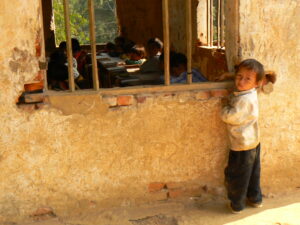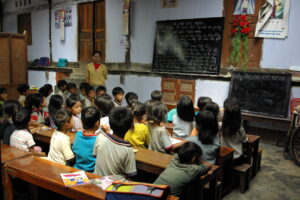Education in Vietnam – A Catalyst for Tackling the Issue of Street Children
Vietnam has witnessed significant progress in its education system, contributing to increased literacy rates and socio-economic growth. However, the country is still grappling with the challenge of street children – a vulnerable population facing various dangers in their everyday lives. This article explores the current state of education in Vietnam, the prevalence of street children, and how education can serve as a catalyst in addressing this pressing concern.
Advancements in Vietnamese Education

Over the past decades, the Vietnamese government has committed to improving its education system, which is divided into five levels: preschool, primary, lower secondary, upper secondary, and higher education. The country has achieved remarkable success in providing access to education, with a net enrollment rate of 98.4% in primary education. Despite these achievements, challenges such as quality education, infrastructure lack, and resource limitations persist, especially in rural areas. Moreover, disparities in education access and attainment still persist for vulnerable groups, such as ethnic minorities and street children.

A study by the Institute of Labor Science and Social Affairs reveals approximately 21,000 street children in Vietnam. These children are exposed to numerous risks including various health risks, including malnutrition, lack of healthcare, and exposure to infectious diseases. They are also at risk of physical abuse and exploitation by adults. They might also encounter mental vulnerabilities as living on the streets often results in emotional and psychological trauma. They are subjected to social stigmatisation and isolation, possibly leading to mental health issues such as depression, anxiety, and post-traumatic stress disorder (PTSD).
Poverty, domestic violence, migration, and limited access to education contribute to the existence of street children. Disrupted family structures and social safety nets play a significant role in their plight.
Education as a Solution
Education emerges as a powerful tool in breaking the cycle of poverty and vulnerability for street children in Vietnam. Providing access to quality education equips them with skills for future employment. Incorporating vocational training and life skills enhances their employability and improves their life prospects.
Policy Recommendations and Comprehensive Approach

To address education disparities, the Vietnamese government should implement inclusive education policies involving support for vulnerable groups, such as street children and ethnic minorities. This may involve financial incentives for families to send their children to school, school construction, and scholarships for disadvantaged students. It is understood that education alone is not enough to address the complex needs of street children. A comprehensive approach is required, involving social protection measures, healthcare services, and psychosocial support to address their mental and emotional well-being. Collaboration between the government, non-governmental organisations, and local communities are essential in providing holistic support to street children.
Raising Awareness and Strengthening Child Protection
Efforts to raise public awareness about the plight of street children and the importance of education in their lives are also critical. Advocacy campaigns can help to reduce stigmatisation and promote a more inclusive society, in which all children, regardless of their background, have the opportunity to thrive. In addition to providing education, it is crucial to strengthen child protection systems to prevent abuse, exploitation, and neglect of street children. This includes establishing and enforcing legal frameworks, as well as providing training for teachers, social workers, and law enforcement personnel to identify and respond to cases of child abuse

To conclude, while Vietnam’s education has made significant strides, the issue of street children remains a pressing concern. By ensuring access to quality education, implementing inclusive policies, and providing comprehensive support, the country can empower these vulnerable children to overcome challenges and build a brighter future
Sources:
- UNICEF. (2021). Education in Vietnam
- World Bank. (2021). Vietnam Overview
- OECD. (2020). Education Policy Outlook: Viet Nam
- Institute of Labor Science and Social Affairs (ILSSA). (2020). Street Children in Vietnam: Challenges and Solutions
- UNICEF. (2020). Child Protection in Vietnam
- Save the Children. (2019). The Situation of Street Children in Vietnam
Children of the Mekong‘s funding is one of the way you can provide support to street children. Through child sponsorship in providing education and vocational training for substantial and sustainable employment, we improves children’s employment prospects as adults with potentially better pay and decent work. Children will have a higher probability of being able to stay and work in their community to enhance the economy.

